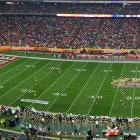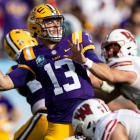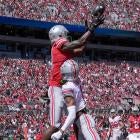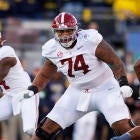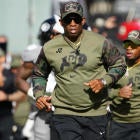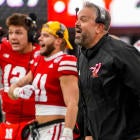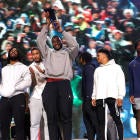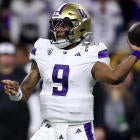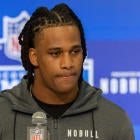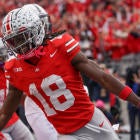Preliminary discussions have begun within two influential college football bodies into possibly removing kickoffs from the game, CBS Sports has learned.
Both the American Football Coaches Association's board of trustees and the NCAA Division I Football Oversight Committee have at least had informal talks about the possibility.
The reason: player safety.
"I don't think there is any doubt it is the most dangerous play in the game," said Big 12 commissioner Bob Bowlsby, chairman of that oversight committee. "How much that's the case and how we can fix it is unknown."
Both entities are reviewing injury data to gauge the impact of kickoffs. Preliminary indications are that injuries occur at a higher rate on kickoffs, according to sources.
Any rules change probably won't come until after the 2017 season. Eliminating kickoffs has not yet been a discussion for the NCAA rules committee, according to its secretary-rules editor Rogers Redding.
However, rules changes typically bubble up to the committee from coaches and administrators. The AFCA acts in an advisory role to the NCAA rules committee. The oversight committee vets any changes by the rules committee before approving them.
"I'm excited we're starting to have this discussion," said Todd Berry, AFCA executive director. "It looks like the data is skewed where we have more injuries on that play. If that's the case, we have to look at eliminating the play, modifying the play, change blocking schemes."
Berry spent 14 years as a head coach. He replaced Grant Teaff this year as the top AFCA executive.
"It's a very, very, very in-depth conversation of how it [kickoffs] affects the game," said Mississippi State coach Dan Mullen, an AFCA trustee.
Both the NFL (2011) and NCAA (2012) moved kickoffs to the 35-yard line, thus increasing the likelihood of touchbacks. When the NCAA moved the kickoff up to the 35, touchbacks increased by 50 percent, Redding said.
Pop Warner youth football, in May, eliminated kickoffs for all youth division teams age 10 and under. It became the first national football organization to eliminate kickoffs.
"My gut feeling is we're going to see it across the board," said Jon Butler, Pop Warner's executive director. "In the long run, it's going to be good for everybody."
An ongoing emphasis on player safety could result in one of the most radical rules changes in the game's history. Former Rutgers Greg Schiano floated the idea of eliminating kickoffs five years ago following the injury to Scarlet Knights defensive lineman Eric LeGrand, who was paralyzed covering a kick.
In December 2012, NFL commissioner Roger Goodell said the league's competition committee would consider eliminating kickoffs. No such move was made.
"If you could look into the data [and] there is a significant injury rate, it would absolutely be worth looking into all options on kickoffs," said Steve Shaw, SEC coordinator of officials.
Mississippi State linebacker Richie Brown has covered kickoffs in his career, advancing from a inside position to near the ball to a "fold" position on the outside.
"That would be really weird," Jones said of abolishing kickoffs. "You need that in the game of football. I looked at it as just another way of making plays."
That rules committee, in recent years, passed and refined targeting rules. Those changes have "absolutely changed player behavior," Shaw said. Several conferences now have limits on fully-padded practices during preseason and during game weeks.
The Ivy League made news in the offseason by eliminating full-contact practices during the regular season.
"I won't tell you we're close to eliminating a kickoff, but I think it's kind of the trend of our rules process now," said Shaw, also a member of the rules committee's editorial subcommittee.
The NCAA has faced increasing liability issues this decade, primarily regarding head trauma. A wide-ranging class-action concussion lawsuit against the NCAA was recently settled for $70 million.
A case involving the death of Division III Derek Sheely is nearing settlement. In a court filing in that case, the NCAA stated it had no "legal duty to protect student-athletes."
"I think player safety now gets a lot of public scrutiny," Shaw said. "That's all I think about is our player safety."
Schiano suggested a team kicking off after a score would have two options: Take the ball on its own 30 and either punt or go for it in a 4th-and-15 scenario.
"There has to be a massive solution because we're changing the entire game in certain situations," Mullen said.
Bowlsby suggested that change could come in increments. For example: Would there be a compromise with FBS conferences adopting the Ivy model -- no fully-padded practices where players are tackled to the ground during the season?
The Ivy League (2013) and Pac-12 (2014) were the first conferences to limit fully-padded in-season practices to twice per week.
"Kickoffs are the play where statistically the most concussions and other things will occur," said MAC commissioner Jon Steinbrecher, an oversight committee member.
"That discussion is coming. It hasn't come on agenda [formally] yet ... I know that's something that popped. It doesn't surprise me the least the AFCA is talking about it."
Berry's desire is to make the organization a much more influential and relevant organization. He has promised "real engagement by our coaches" beginning in 2017.
"We're certainly going to listen to them," Bowlsby said.
Bowlsby heads the 12-person oversight committee. Mullen is the only FBS coach on the committee. Mullen is also one of 14 FBS head coaches on the AFCA's 22-member board of trustees.
Last season, Clemson led the country in kickoffs with 115. Texas-San Antonio returned the most kicks, 70. The NCAA would not provide injury data being shared with those various committees.
An NCAA spokesman told CBS Sports the association "continues to monitor injury trends."
"The fragmentary data we do have [is] most concussions happen [at a higher rate] on kickoffs," Redding said. "It will be discussed."
The NCAA is in the midst of a wide-ranging head trauma study led by chief medical officer Brian Hainline.












